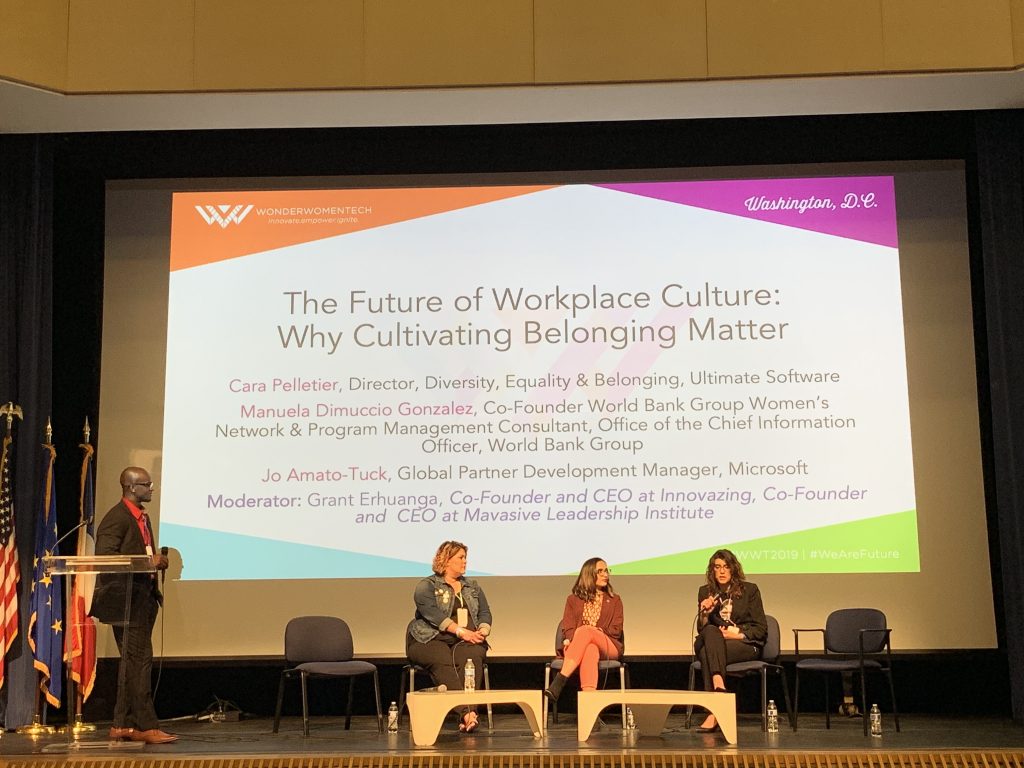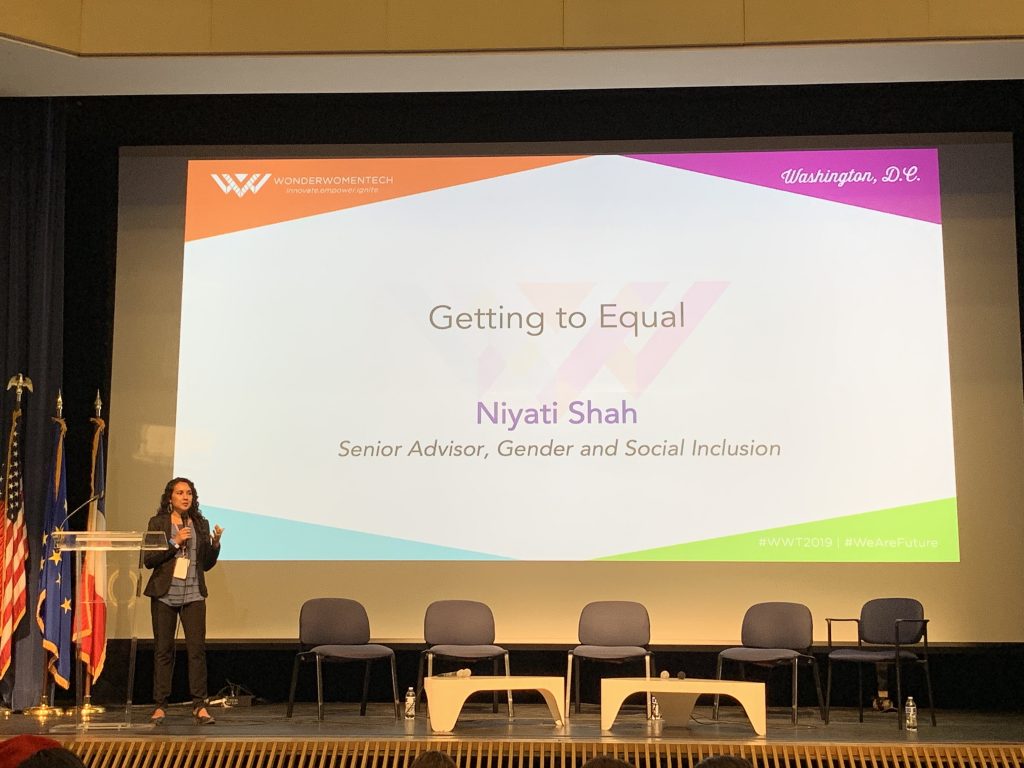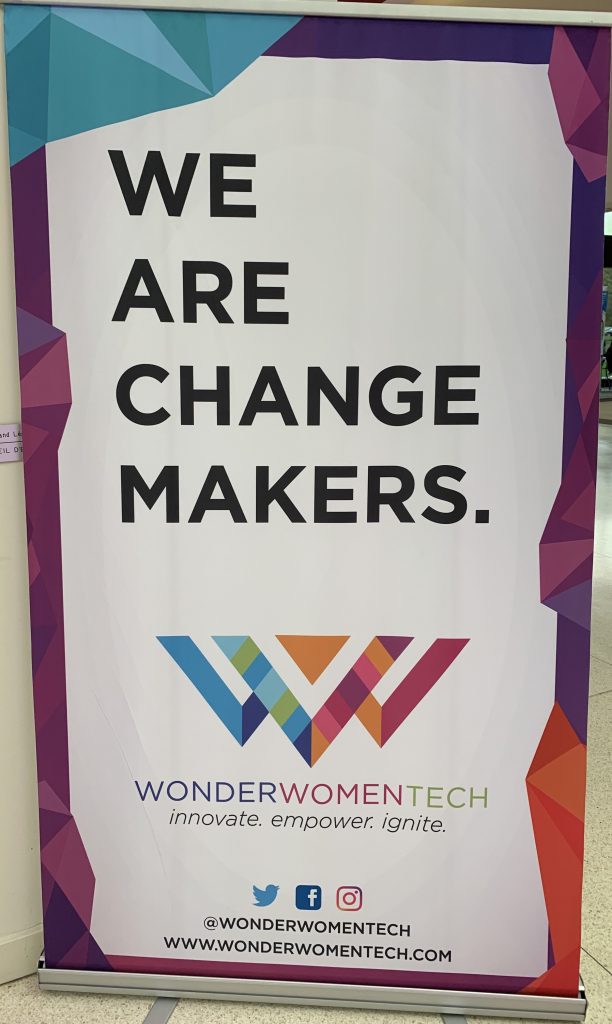Yesterday, Fifth Tribe had the opportunity to attend the 2019 Wonder Women Tech (WWT) Global Summit here in Washington, D.C. The event was hosted at the Embassy of France and featured over 40 speakers, a variety of panel discussions, mentoring sessions, and a career fair. #WeAreFuture was this year’s theme, and it frames the idea that leaders and changemakers are around us (and in us!) all. To build a better world and to cultivate a culture of belonging and humanity, WWT offers conferencing and programming geared towards women, girls, people of color, LGBTQ, and underrepresented and diverse communities in order to shift diversity and inclusion within STEAM (Science, Technology, Engineering, Arts, Mathematics).
Fabi and Schuyler, Fifth Tribe’s Content Marketer and Lead Visual Designer, joined me at the WWT conference. We had an eventful (and fun!) day at the Embassy, and spent the majority of our time attending a variety of speeches and panels. The itinerary for the event was jam-packed, and nearly every hour featured discussions about innovation and technology, gender and social inclusion, female empowerment, and the global workplace landscape. Below are some of our favorite moments from the conference:
1) Cultivating Belonging in the Workplace

The first panel discussion of the day was titled “Future of Workplace Culture: Why Cultivating Belonging Matters.” The half-hour conversation featured three women from different organizations in open dialogue about the distinction between inclusion and belonging in the workplace; on the panel were @RadicalWelcome’s Cara Pelletier from Ultimate Software, @WorldBank Group’s Manuela Dimuccio Gonzalez, and Jo Amato-Tuck (@mamajoamato) from @microsoft.
The panel opened up with a metaphor presented by the moderator, @GrantErhuanga from Innovizing: “Diversity is being invited to the party. Inclusion is being asked to dance. Belonging is dancing like nobody’s watching.” The three women ran with this idea and dove into conversation about the distinction between inclusion and belonging in the workplace and why it’s important to cultivate belonging through inclusive practices. When asked about what we, as women, can do to create and promote inclusive and diverse environments, the three leaders advised the audience to “go against the norm because the norm is not working,” “find your passion, and be brave and provocative enough to try new things,” and “be an encourager of women and minority people around you, and share opportunities with them when they’re available.” Fabi shared with me that this panel was her favorite part about the conference because of the way the speakers’ empowerment was expressed and communicated in different ways; for example, each woman had different perspectives as to how companies can be better about fostering belonging. She said, “Their exchange of ideas shows how treatment of women in the workplace is evolving; there is more importance being placed on the well-being of the employees and how it relates to them doing their job well.” For all three of the Fifth Tribe ladies, this panel was a highlight of the conference because it exhibited honest dialogue between brilliant and inspiring women who all had unique insights into an issue that hits close to home for females, people of color, and other minority groups.
2) Overcoming the Stereotype Threat
One of the first events of the day that my coworkers/friends and I attended at the WWT Summit was a speech by Chris Michel, the Americas Head of Diversity & Inclusion at Bloomberg LP. His role is to provide leadership and guidance to his firm in regards to diversity and inclusion in order to improve competency and become an industry leader in these efforts. Outlining how and why companies who embrace diversity and inclusion are more successful and impactful, Chris explored ways by which the collective “we” can prepare for a future driven by technology.
In addition to the importance of mentorship, visibility, and empowerment, Chris also discussed the risk of the “stereotype threat” that women and people of color are susceptible to. This phenomenon is best characterized as the situational experience in which people in stereotyped groups – e.g. females, people of color, LGBTQ communities, etc. – are at risk of self-confirming a negative stereotype about one’s group(s). The stereotype threat is a significant contributor to the perpetuation of racial and gender gaps, largely in part because it increases cognitive stress for those who are susceptible to it. However, building safe spaces – particularly within STEAM – can offer stereotyped groups, like girls of color, the opportunity to combat this experience. For example, early exposure to mentoring and modeling behaviors, like enthusing and engaging young girls about STEAM subjects rather than intimidating them, can set them up to cultivate confidence despite stereotypes. That Chris evaluated this issue in detail characterized his speech as Schuyler’s favorite moment of the day.
3) What would an equal world look like? What would it feel like?

In her speech titled “Getting to Equal,” Niyati Shah (@awakenvision) spoke about the gender gap as systemic oppression and how this inequity, along with others rooted in race, culture, etc., are compounded when they are layered on top of one another. She is a human rights and social inclusion leader who works to address gender inequality and social inclusion, and I was most deeply affected by her talk because of her undertone of combating gender-based violence.
Systemic oppressions overlap and intersect in both implicit and explicit ways, manifesting in stark injustices not only in the workplace, but in the world as well. “The system must be shifted,” Niyati said. “Oppression is rooted in a system that doesn’t work, so the table has to be flipped.” She gave the example of gender-based violence around the world, and how it’s oftentimes tolerated – if not encouraged (e.g. child marriage) – because it is so ingrained in the system. Niyati did not offer a step-by-step outline of how exactly these systemic injustices can be eradicated, but she did leave us with the encouragement to imagine a world in which pay is transparent. Pay inequality is illegal. Everyone is paid their worth. The world is equal, and it feels equal. What would this world look like? “Imagine that,” she concluded, “and create it.”

Though I could have revelled in these moments forever, what I will never forget about this year’s WWT conference was the feeling of unity, empowerment, and inspiration that floated over the crowd. Besides Schuyler and Fabi, there were hundreds of other women (and men) who came together for a day of dialogue, determined to learn from one another and to lift each other up. If you have the opportunity to attend any program or event hosted by @wonderwomentech, I highly recommend it! More information can be found on their site here.


